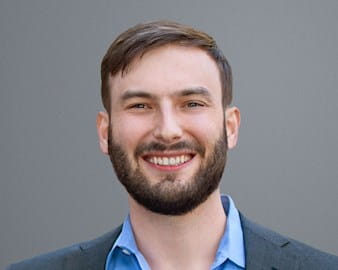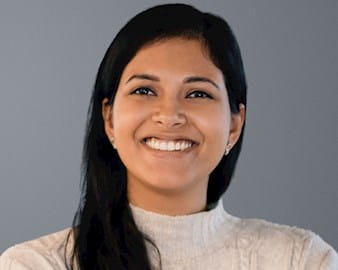Nick Lilovich, ’17, had seen before that it was difficult to find necessary research in many technical fields. But it was after taking A.I. and big data courses at Booth alongside his wife, Sruti Balakrishnan, ’17, and re-encountering the problem at McKinsey & Company that he decided to act.
In 2020, Lilovich launched The Collaboratory, which uses A.I.-powered aggregation search and recommendation tools to help researchers “find the right data at the right time.”
From the get-go, the mission was to improve both data discovery and collaboration between teams within an organization—and ultimately, deliver value to patients in the biopharma industry. Now that The Collaboratory has raised $1.65 million, they’re one step closer to that goal.
Chicago Booth Magazine sat down with Lilovich, cofounder and CEO, and Balakrishnan, former COO and current advisor, to discuss why science research takes so long, what it’s like working with a Booth spouse, and how they negotiate risk.

Nick Lilovich: The beginnings of The Collaboratory came when I was an undergrad in nanotechnology research. I felt a step behind the best public research and cool stuff that the folks in our lab or our institution were doing. I had access, but I had to go out and find it myself. Then and now, the search and discovery tools available to scientists are poor, especially for documents or data within an organization. There are Google alerts you can use, but inside an organization, there’s basically nothing.
Sruti Balakrishnan: My early career was in consulting. Although I’ve never been a researcher, I understood this inefficiency in data discovery and sharing. In consulting, I’d see teams do tons of work and collect useful analysis, and none of it would get shared! It would live on someone’s drive and you’d end up having different teams across the world doing very similar things. I knew there had to be a better way to share this information.
Lilovich: While I was becoming a data scientist in agriculture and agricultural tech, I learned that crunching and analyzing the numbers wasn’t the hard part of the job. The time-consuming part was finding the data that would even enable us to come to a conclusion, or finding people with the right context to give in terms of the kinds of problems we were trying to solve. Often, you had to use the best available data to come to a weaker conclusion. I went to different industries but kept encountering this problem. I left McKinsey right before COVID, so when I found it hard to find a job, I asked Sruti, “Can I spend time working on this idea without looking for a job?” Sruti, being the wonderful partner she is, said, “Sure, but here are some milestones you have to hit in the next few months.” She set hard milestones, but I hit them. So we were off to the races.

Balakrishnan: When Nick started working on the discovery engine, I thought the idea was interesting. But my questions were, “Who’s your customer? How are you going to make money? What market are you targeting?” Nick is very much a scientist and technology guy, so he was like, “This technology is amazing.” And I was like, “Cool. Tell me how you’re gonna make money.”
Lilovich: A.I. has a lot of different fields, and one of them is natural language processing (NLP). Recently, a series of innovations occurred that made it much easier for these large language models, LLMs, to fundamentally understand a text. Meaning, when you’re given an input of, say, a paragraph, A.I. can now do things like complete the sentence, or suggest a paragraph similar to the one you shared—not just with term matching, but with concepts. Once you have that technology, you can deploy it lots of ways. One is recommendations, where you can take two pieces of text and say they’re similar—that’s how you can recommend similar documents in a direct search.
“A.I. can now do things like...suggest a paragraph similar to the one you shared—not just with term matching, but with concepts.”
— Nick Lilovich
Balakrishnan: Nick worked on his answers to my questions and they got better and better. I was working at Policygenius, a post–Series D insurtech startup. My experience is very different; I was setting a business unit strategy, running sales and success teams. But I was also helping Nick out. I wrote his Techstars application.
Lilovich: To be fair, it’s not like she did it completely without me! [Laughs.] But yes, Sruti was involved the whole time. We founded the company in August 2020, and put together the beginnings of a team including my cofounders, Branton DeMoss and Rafael Jardim. That’s when I asked Sruti whether instead of working for another startup, she could work for this startup. We got into the Techstars Chicago accelerator, and went through it together.
Balakrishnan: When Nick got into Techstars Chicago, I said, “You’ve been working on this a long time. Let’s double down. If both of us are working on it, this needs to succeed or fail quickly.” Our motto was “Build faster.” Neither of us paid ourselves. We lived on savings. We went through Techstars in 2021, which helped us realize the initial business model didn’t make sense, and that biopharma was the right market.
Lilovich: Sruti figured out our market was biopharma, where drug discovery now takes 10 years and $2 billion to get a single drug—it’s incredible how expensive and slow that process is. Any edge on that problem will be an enormous value for patients, especially those with rare diseases. We were just talking to a professor who works in ALS, and as we walked through a demo of our platform, he said, “Wow. The last literature review I did involved 16,000 papers; using your tool I could shave that down by 100x.”
“Our motto was ‘Build faster.’ Neither of us paid ourselves. We lived on savings.”
— Sruti Balakrishnan
Balakrishnan: We talked to potential investors, and when it looked like Nick was in a stable spot, I was like, “Great, this business is a real thing. I don’t think I’m needed anymore.” I’m a generalist who was able to help him develop a strategic plan and the initial infrastructure—but when he really started going after the target market of biopharma, I felt he needed someone with more specific industry experience in the COO role.
Lilovich: Sruti’s memo said, “You should fire me, and here’s why.” I was like, “You’re right. This is no longer the right place for you.” So she found a job in technology and insurance.
Balakrishnan: One of the things Booth helped me with is the ability to measure and think about risk more objectively. Before Booth, the idea of “Let’s go from one of us earning an income to neither of us” would have been insane. But, because of my economics classes, the way I thought about it was that Booth gave us a tremendous safety net. I was able to do the calculations: “How much savings do we have? How much time does that give us?” and say, “We can accept X amount of risk.”
Lilovich: That “forcing function” is in the Booth blood. You learn how to figure stuff out so you can make a decision and do the next thing. Some of our investors are even associated with Booth adjunct professors, including John Paul Rollert and Dennis H. Chookaszian. I earnestly feel this company wouldn’t have been possible without my time there.


